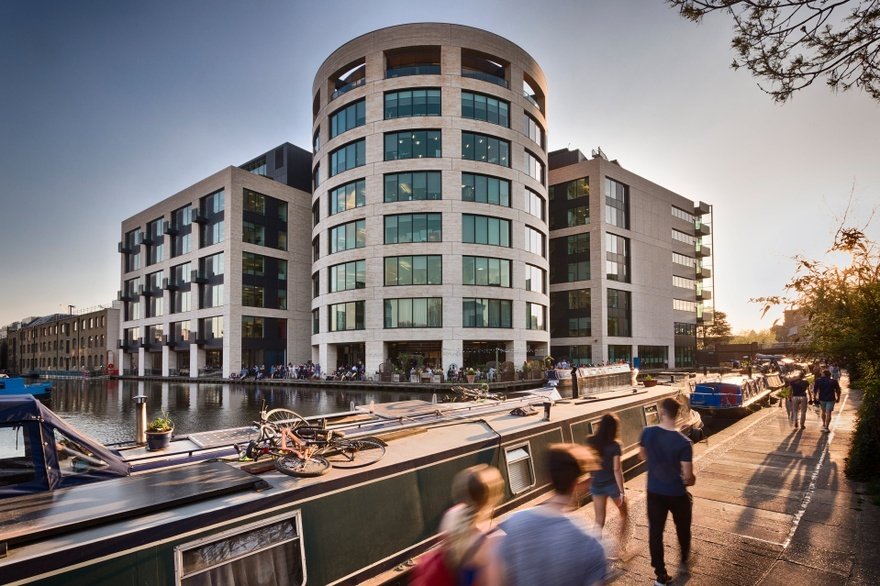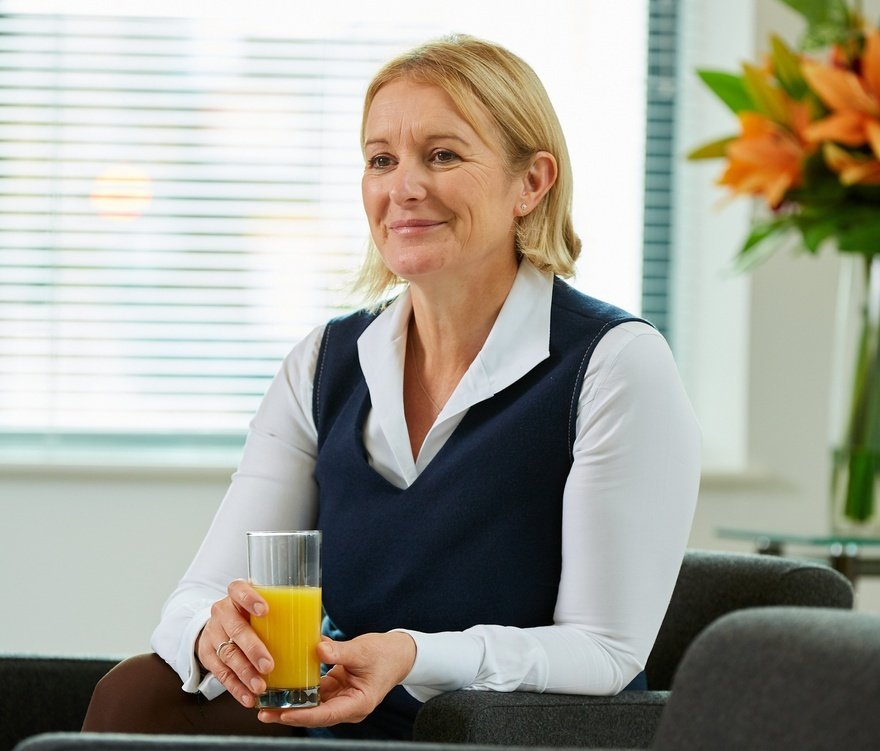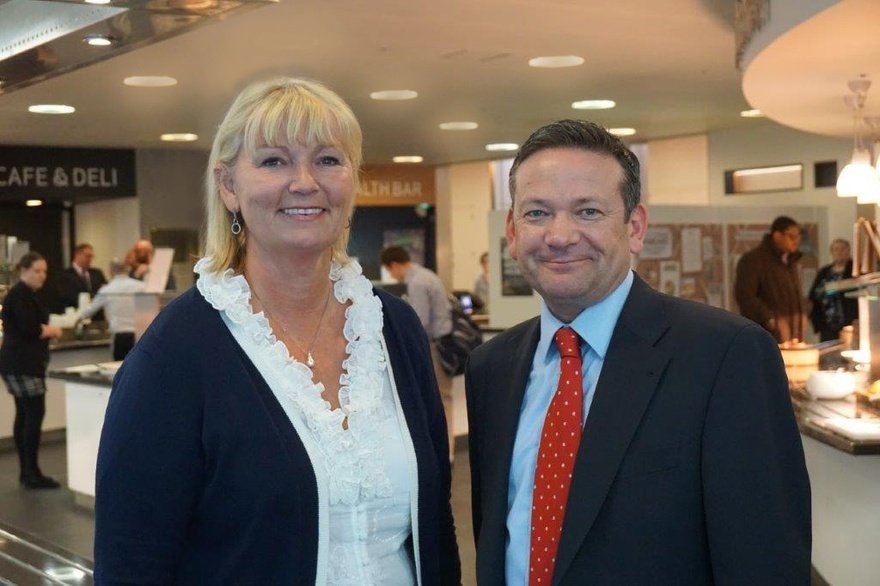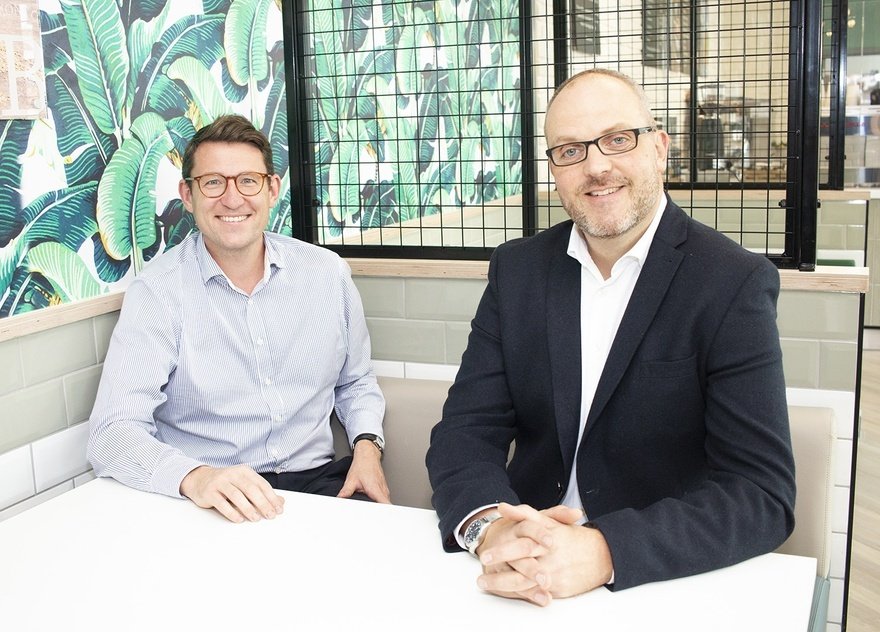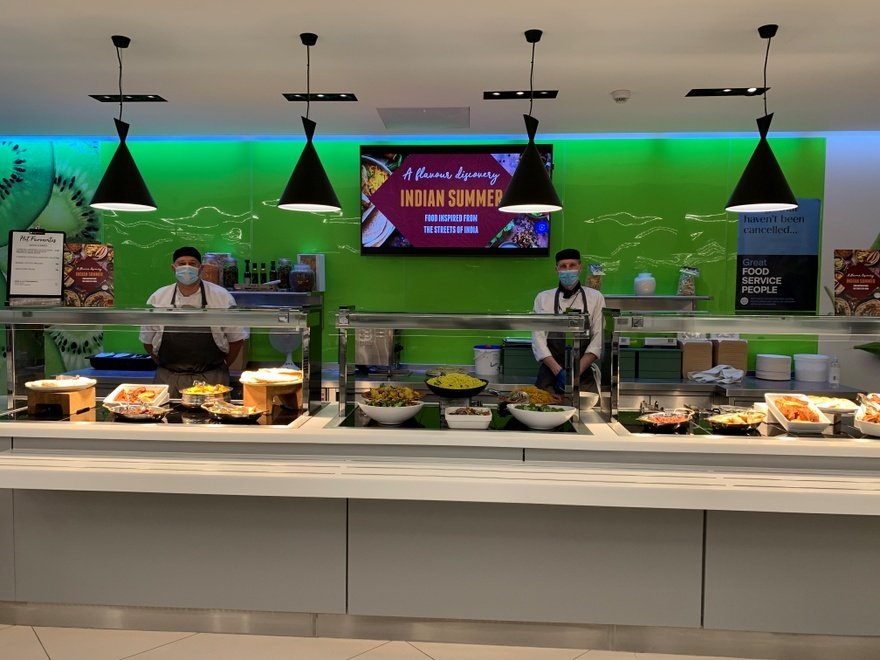Let's do lunch: How workplace caterers are remoulding for the post-pandemic worker
Contract caterers are offering flexible contracts, quality food and new technology, working alongside clients to tempt employees back into workplaces. Ben Walker discovers the future for B&I catering.
As the government's roadmap out of lockdown allows companies to start thinking about reopening their offices, business and industry (B&I) caterers are feeling cautiously optimistic.
Matt Symonds, CH&Co's managing director for workplaces outside London, says that some of his clients are talking about gradual reopening from May, with volumes growing from July onwards, "assuming we are able to remove the physical distancing measures".
John Nugent, chief executive at Green & Fortune, says: "With early summer as a significant breakthrough for the vaccine rollout, the full effect of people returning to offices will not be seen until September."
At Kings Place in central London, however, Nugent is working towards opening catering services on 12 April when outdoor dining and drinking will be allowed.
Sam Scott, managing director, corporate services, Sodexo UK & Ireland, adds: "We are finding that most clients are looking to return between Easter and June with a phased approach, of around 30% to start with. But Ireland is completely different and looking at January 2022, due to the slow vaccine rollout."
The working from home shift
Although levels of caution vary from client to client, catering consultant Chris Stern, for one, is in no doubt about the public's appetite for returning to the office.
"People are dying to get back. It's not going to be like it was before, but I think people are fed up to the back teeth with being at home and not seeing anyone – which is a personal thing, not just a work thing," he reckons.
"They're missing that interaction and I'm getting a sense that a lot of companies are beginning to struggle with managing their culture. It's starting to become noticeable that this is not an ideal way of working."
A lot of companies are beginning to struggle with managing their culture
Working from home saves commuting time and has work-life balance benefits but, as with most things, it is best done in moderation. Research published by the World Economic Forum suggests that productivity can be maximised if employees work from home just once or twice a week rather than all the time.
A survey commissioned by Sodexo showed that 88% of UK workers who work from home said they'd like to continue, with three days at home a week the most popular option.
B&I caterers point out that flexible working already existed long before the pandemic. "Friday has been tailing off for the last 10 years," notes Allister Richards, chief operating officer at CH&Co. "We've got a lot of coverage in technology, communications and media organisations where the culture is a lot more autonomous with regards to where and how you work."
One potential positive for caterers to capitalise on is a higher spend by workers when they do come in, since they'll want to make the most of their time with colleagues.
Visiting a City of London site operated by CH&Co between lockdowns last summer, Stern says he was "astonished" to see how much people were spending: "In a typical London financial services staff restaurant, you'd take £2.50 to £3 per person every day. The day I was there, they took £6 off everyone on site."
Richards concurs: "As transaction volumes have gone down, transaction values have gone up. People may end up spending £30 over three days instead of five. You've got to see the opportunity in this."
Forking out
Another positive for caterers is that some firms will be cash-rich because of the pandemic. "Take law firms," offers Stern. "Typically they spend a lot on hospitality, sometimes into the millions. Over the last 12 months, they've saved all that money."
Early in the pandemic, Stern noted several companies delivering free food to desks. "This typically happened in media organisations. Companies thought: ‘We need to support our people and we can't open the restaurant as per normal, so we'll deliver free food.'"
While some companies are flush with money, others are reducing their office space or looking carefully at how to utilise their estates. Even so, catering can play a cost-effective role in maximising productivity.
"They'll want to encourage people to come in on Mondays and Fridays. How? Offer free pizza, of course," says Stern. "They'll want to make offices attractive and beneficial places to be and catering is definitely part of that."
They'll want to make offices attractive and beneficial places to be and catering is definitely part of that
In a survey commissioned by Compass Group, employees ranked a staff restaurant as the third most important non-financial benefit, after health insurance and flexible working.
Morag Freathy, managing director of business and industry UK at Compass Group, says: "Businesses are realising that if they want employees back at headquarters to spark collaboration, improve morale and increase productivity, then they need to be tempted back and their mealtime, break, coffee and all-day grazing needs must be considered a priority – not just now, but for years to come."
Increasing flexibility
Responding to the changing needs of clients, B&I caterer Bartlett Mitchell created Mosaic, a standalone subscription model for clients who do not require a full-time catering service, but rather a mix of temporary pop-up catering provision, ad hoc reception services and hospitality.
"The model enables clients to flex their requirements based on the volume of people they have returning to the office. The subscription element means they have clarity over prices and control over costs. It allows businesses to budget for a year," explains executive chairman Wendy Bartlett.
So far, six clients have chosen Mosaic, which is available across the Westbury Street Holdings portfolio of catering companies.
Sectors such as manufacturing, distribution, warehousing, logistics, online retail and pharmaceuticals have generally carried on working as normal throughout the pandemic.
Other clients are essentially in hibernation. "In some instances, there are low levels of cost that in order to remobilise we have to keep going. We agree how they are covered with clients. There's a cost to keeping the lights on. Furlough hasn't taken that away. There are costs to our infrastructure, our departments, quality, health, safety and environmental management, and our ongoing financial obligations," explains Richards.
Looking forward, Bartlett believes that all types of contract are still on the table, whether commercial, cost-plus or fixed price: "All we would ask from our clients is more information regarding what the viability is. Fundamentally, this is about partnership. We all need to collaborate more."
Simon Houston, director, Houston & Hawkes, adds: "The ability to build added flexibility into contracts is clearly beneficial to all parties and not unique to the foodservice sector. This doesn't necessarily mean that ‘stop start' or ‘on demand' contract models are the way forward – quite the contrary. Clients should look to their catering partners as trusted advisers who can provide balanced and professional support as we navigate the complex journey ahead."
In terms of newly signed deals, Stern says cost-plus management fee contracts are prevalent, in which the client pays all of the costs associated with running the catering (whether above or below budget), plus a management fee.
"Clients can't tell caterers how many people are going to be on site. It's difficult for the clients to guarantee anything. They might predict 300 people and 200 turn up, and suddenly you've got a load of surplus food," he says.
Even in such a case, the caterer's costs would be covered under a cost-plus contract, which would not necessarily be the case with a fixed price or guaranteed maximum price arrangement. Nevertheless, once things stabilise and everyone has a clearer idea of volumes, caterers will start to take more responsibility again, predicts Stern.
Uncertainty about who is going to turn up for lunch is nothing new. Workplace catering has always been a fairly unpredictable business, dependent on factors such as the weather and what's happening in the company, notes Bartlett.
"We could have a rainy day and suddenly our customer numbers double. If it's sunny, we might lose everyone or they might all be away at a sales conference and no one told us. We're used to that. It just shows the skill of our teams. Caterers are amazingly resourceful," she says.
At all costs
There is no way to sugar-coat the drastic impact of the pandemic on workplace foodservice. Caterers across the board have had to cut costs and restructure in order to survive.
By the end of 2019, powered by a remarkable run of M&A activity which saw a number of independent catering firms join the group, CH&Co had grown to 10,000 employees and £500m turnover. Then the pandemic struck.
"During the first lockdown, our business was trading at less than 15% against pre-Covid volumes. You can't sit on your hands when that happens," Richards remembers. "In common with our peers, we had to act quickly and decisively over and above furlough because of the contributions required from furlough."
Our business was trading at less than 15% against pre-Covid volumes. You can't sit on your hands when that happens
He continues: "A number of our clients have been able and willing to step forward and meet the supplementary furlough contributions and maintain employment opportunities, keeping teams on sites, but others haven't been able to do that. We've tried to maintain as many people in viable employment as we can, but we have had to cut costs."
This has meant two rounds of restructuring. "Redundancies or downsizing are difficult at the best of times, but doubly difficult when you know that the opportunities in hospitality are simply not there. Ordinarily, you make someone redundant and they can go and get another job because it's a vibrant employer, but the whole sector has been beleaguered," says Richards.
Before the pandemic, Bartlett Mitchell had a turnover of £46m and employed over 1,000 people. In October 2020, the firm was acquired by Westbury Street Holdings, the parent company of BaxterStorey. Bartlett says that the deal provides the business she co-founded 21 years ago with increased financial security and greater career opportunities for its employees.
CH&Co has undergone refinancing and fundraising with existing lenders and shareholders. The company is majority-owned by its management team, with private equity firm Equistone holding a minority stake. Richards comments: "We've been incredibly fortunate with the long-term view and level of support from Equistone and we've kept a very firm hand on the tiller in terms of costs and forecasts. We've not fallen foul of being overly optimistic. Thank goodness, because [the pandemic] has gone on longer than any of us anticipated."
Caterers now need to invest in the future while revenues are still low. Richards describes this as a tricky but important balancing act: "It's great that there's positivity at the moment aligned with the roadmap, but positivity doesn't convert to cash. There's a time-lag, so every responsible business has to try – and it's impossible to do it perfectly – to match the pound you spend with the pound you take.
"We need to bring people back, invest up front, but we're not realistically going to see the fruits of a volume increase until late summer."
The return to offices will be staggered and differ across the country. Bartlett says: "The regions will adapt much more quickly than London, which will have the biggest challenges. While we are seeing lots of movement from London clients and we're working hard to help them find solutions, we believe it will take them longer to come back to what their new level is."
Sam Scott at Sodexo agrees: "Central London is highly dependent on the public transport network and therefore this remains the challenge until vaccination is fully deployed and the reinfection rate is vastly reduced."
In summary Richards says: "The last 12 months have been about holding your nerve, trusting in the businesses and the client relationships. It's also meant us making some investment in the future and investing in those relationships. It's all about trying to rebuild opportunities for people to come back and join us. As long as we step into things with a degree of caution and a well-managed return, the future looks a lot more positive."
The new workplace
"The new workplace is not just about the physical boundaries of an office, but also the employee experience, wherever and whenever teams are working," says Sam Scott, managing director, corporate services, Sodexo UK & Ireland.
This means delivered-in food wherever needed and meal kits for employees to take home for their evening meals or when working from home the next day.
Consumers will increasingly expect at work the same digital applications, speed and ease of use that they take for granted elsewhere.
Sodexo's new value proposition for corporate clients, Vital Spaces, includes delivered-in food services, digital on-site food ordering, and the use of food lockers, where employees can collect freshly prepared meals.
Simon Houston, director, Houston & Hawkes, adds: "The front-end technology solution to enable click and collect, personalisation, scan and go, and table bookings, is now a necessity in workplaces and not a nice to have."
For Houston, being a young company only established in 2019 has been "a huge advantage" in delivering what the modern workplace needs. He says: "A lot of what is being introduced to the market now, we were able to integrate into the very fabric of our business – flexible contract models; delivered-in solutions; intuitive app-based technology; allergen management systems; and social enterprise and wellbeing initiatives."
Continue reading
You need to be a premium member to view this. Subscribe from just 99p per week.
Already subscribed? Log In





